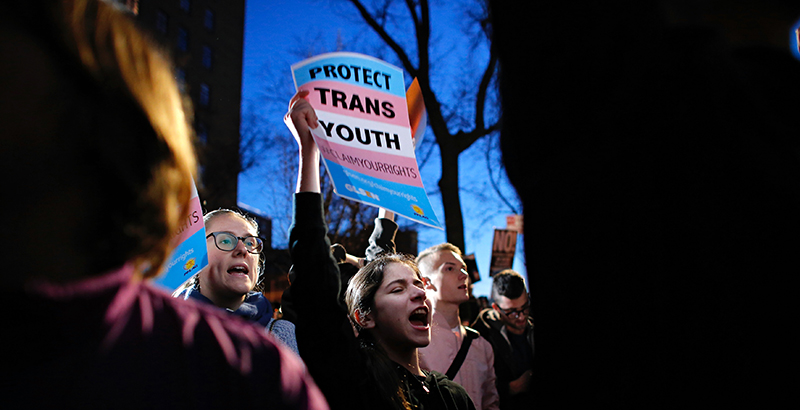Rotherham: We Need a National Commission on Inclusion for Transgender Student Athletes

Get essential education news and commentary delivered straight to your inbox. Sign up here for The 74’s daily newsletter.
When I was in high school I worked part time at a dry cleaners. One day, a regular customer came in and asked to speak with me privately. He was, he told me, about to undergo a process to change his gender that involved some physical changes and was concerned that because the legalities would not catch up in time, cashiers might not take her checks (checks, this was the 1980s) because she would no longer match their drivers license.
They understandably wanted to smooth things over in advance.
I remember having two reactions. First, at 16, one was certainly, ‘OK, this isn’t a question we get every day around here.’ But I also remember thinking to myself how hard it must have been for this middle-aged person to be trapped in a life they didn’t want. I had a sort of intuitive, now more developed, sense that life is not easy so people should just do whatever makes them happiest.
A few years later, when an old friend married another woman in the early 1990s, it was controversial for all the usual reasons, but I remember being proud of her and not seeing what the big deal was and why it mattered what the state said anyway. Again, just do whatever the hell you want. It wasn’t until the first legal gay wedding I went to, in New York about two decades later, that I realized the power of state sanction. What the state does is a big deal when it comes to inclusion.
That sometimes unavoidable collision between the personal and the state is the crux of the quickly escalating debate about transgender students and sports. In particular, who should be allowed to play women’s sports is becoming a politically charged flashpoint.
Much of the culture war theatrics about transgender issues are a poor fit for education. If you’re not going to call kids what they want to be called, make accommodations to keep them safe, and otherwise respect their basic humanity, education is not the career for you. Most people don’t get that worked up about things like pronouns and in general anti-LGBT sentiment is in no small part generational. To borrow from Dr. King, on LGBT issues over time the arc bends toward inclusion.
But the arc can nonetheless be long and tortured. Especially where politics are concerned. One of former President Trump’s biggest applause lines at the conservative CPAC political gathering earlier this year was about transgender students and women’s sports. That wasn’t a coincidence or off-the-cuff moment. He’s returned to the theme since. It is Trump’s usual blend of hyperbole, tactlessness, and politically potent reading of the public mood. Obviously, this won’t become the one issue where the former president injects nuance and calms the water.
It’s not just Trump raising the issue. California gubernatorial candidate Caitlyn Jenner said recently she’s against letting transgender women play women’s sports. Transgender students and sports are already a common attack line about the Biden administration and House Democratic priorities. An amendment that would withhold federal funds from K-12 schools or colleges that allow a “student whose biological sex is male to participate in an athletic program or activity designated for women or girls” was narrowly defeated during debate on President Biden’s $1.9 trillion COVID relief bill. We’ll be hearing a lot about it between now and November 2022. More than half the states are considering legislation to ban transgender students from women’s sports altogether. Seven states, including sports-focused Florida, have actually enacted bans and in one state, the governor did it by executive action. The courts will have a say about all this as well.
It’s a confused conversation and the public is split. Sure, there is bigotry — any debate about including transgender students in sports that turns on how God created humans is not really about sports at all. And yes, it would be nice if everyone suddenly concerned about women’s sports showed up for the routine athletic slights and second-class status girls and women endure all the time.
Proponents of banning transgender students from sports overstate the prevalence of transgender athletes today. Opponents, meanwhile, at once cheered the Biden administration’s decision to withdraw from an actual pending federal court case brought by four female track athletes in Connecticut while chirping on social media that there is no issue here at all. For both sides it’s a proxy fight about inclusion for transgender people in American life, which is by extension part of a larger culture war. As a result there is more heat than light and what both sides have in common is some indifference to any specifics.
Yet the specifics matter. In practice, there are real complexities here that will land on the doorstep of high schools: the level of youth sports where this is really a substantial public policy issue.
The NCAA has policies for transgender athletes governing collegiate sports and the International Olympic Committee does for Olympic competition. The rules cover issues like testosterone levels and pre-requisites for participating in women’s sports. These policies are not without reasonable criticism and unsettled science, but they are legitimate efforts to balance fairness with inclusion. Some of the legislation, including the federal amendment, would supersede these policies.
Youth and school sports remain more of a patchwork of rules — or no rules at all. There are some unique aspects of high school sports in terms of mission, inclusion, and adolescent human development. So the Olympic or NCAA models don’t fit high school sports because measures like sitting out for a year are impractical at that level and become de facto exclusion. Likewise, requiring students to take certain medications or undergo medical procedures to participate in high school sports raises a host of ethical concerns. And the issue also affects different sports differently. Archery is probably different than track and field and those sports raise separate issues than, say, ice hockey.
On the extremes, we hear that if someone is transgender then a cost is simply foregoing sports. Or, conversely, that a student who identifies as a transgender student should be able to play any sport they wish and anything less is straight up transphobia. The solution to clearly exclusionary attitudes can’t be a totalizing one that ignores complicated issues that arise where adolescents and competitive and contact sports are concerned. This is the issue for competitive high school sports in general because post-puberty there are physical differences between biologically male and female athletes. It’s also not bigoted to be alert to potential risks to women’s sports, where hard-won gains are still fragile and simply going “co-ed” poses real risks to opportunities for girls.
Complicated, though, doesn’t mean insurmountable for those concerned about balancing inclusivity and opportunity with fairness and safety in sports. In addition to lessons from the NCAA, the Olympics, and other countries there are probably also lessons to be learned from other sports leagues, for instance the Paralympics, about how to balance inclusion with fair and safe play.
All this is why K-12 education and youth sports more generally would be well served by a national commission to bring together stakeholders from across the spectrum of these issues with an eye toward developing model policies to balance inclusion with the realities of high school-level sports. The answer here cannot be a blanket ‘no’ any more than it can be anything goes. Yes, commissions are often a strategy for punting on hard problems. And no, they don’t have a mandate to force adoption of their preferred policies. But sometimes well-designed commissions with genuine mandates to listen, learn, report, and recommend can pave the way for effective policy. And voluntary standards that states or sports leagues could choose to adopt might be exactly the way to lower the altitude from hypotheticals to specifics and build consensus.
Right now there are a lot of conversations, various groups lobbying Congress and the states, and too many people quietly expressing concern about the absolutism characterizing the debate, but not speaking up for fear of retaliation. The writer Andrew Sullivan noted recently, “If you are an opinion writer, you really do have to be a masochist to even want to dabble in [this] debate.” The increasingly strident rhetoric is not leading to reasonableness or detente but rather just spinning each side up even more. It is, of course and not coincidentally, a fundraising juggernaut.
That’s the way in our polarized times where every contested issue turns into a social media-fueled toxic centrifuge of weaponized animosity for each “side.” It works for political consultants or activists looking to “mobilize the base” or raise money, but rarely for well-intentioned people trying to sort through complicated issues. For instance, when Florida’s legislature recently passed a ban on transgender students playing sports the bill was wildly mischaracterized by advocates and subsequently in the media. Sensational headlines claimed the bill would “allow schools to subject minors to genital inspections.” The bill, now law, has real problems in my estimation, but you probably won’t be surprised to learn that’s not exactly how it would work.
I’m not a masochist, I’m an optimist. I don’t have a model policy up my sleeve but believe that collaboratively we can do better.
We should proceed from the base assumption that getting as many kids involved in sports as possible is a good thing in terms of overall wellness, healthy lifestyles and skills like an ability to work with others. Most people agree we need a far broader culture of inclusion in sports than we have today — for all young people, too many of whom are excluded from sports for various reasons ranging from how youth and school sports are structured to personal finances and, yes, sometimes anti-LGBT sentiment. If the north star is how to get and keep more kids playing, the other issues can be sorted out.
Sure, a commission sounds like weak soup as a response to what’s quickly becoming another political wildfire. Yet done well it might be just what we need to lower the temperature and put the focus back on what matters for kids rather than Kulturkampf.
Get stories like these delivered straight to your inbox. Sign up for The 74 Newsletter

;)
